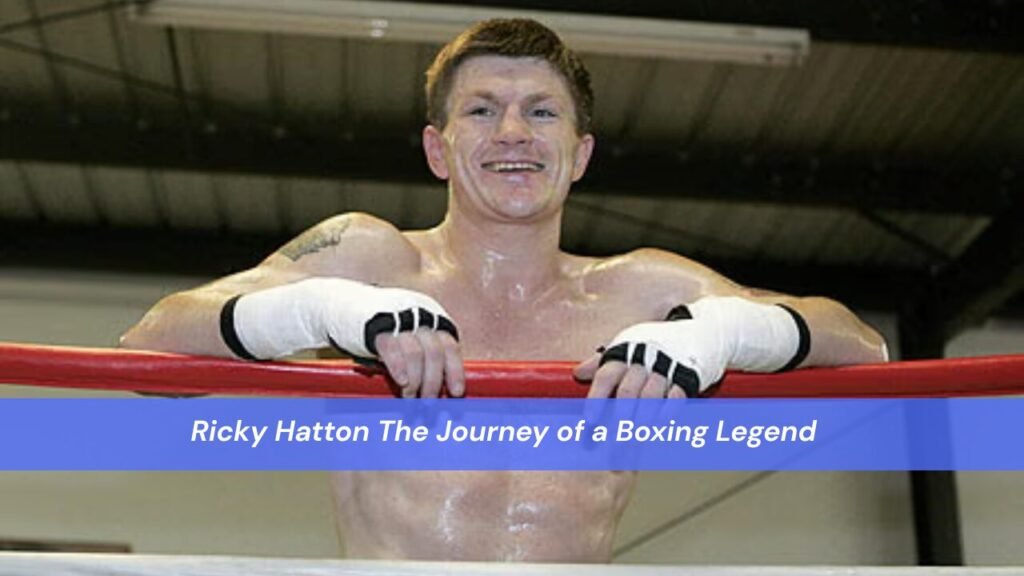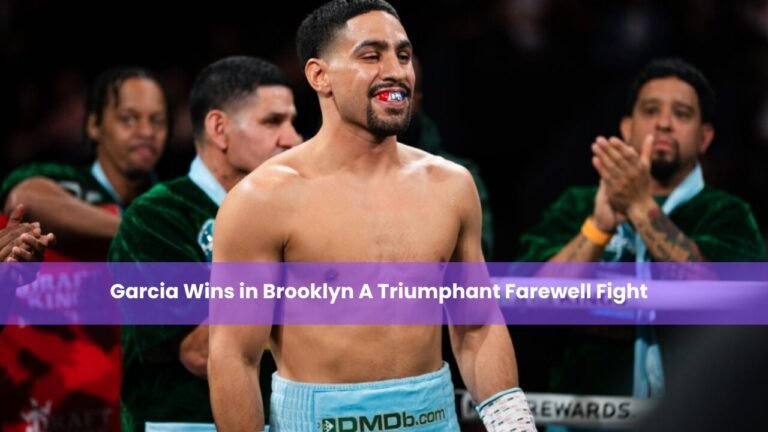Ricky Hatton remains one of the most beloved and discussed figures in British boxing history. Known affectionately as “The Hitman,” Hatton captured the hearts of millions with his relentless fighting style, down-to-earth personality, and the unmistakable roar of his Manchester faithful following him around the world. From his early days in Stockport to the dazzling lights of Las Vegas, Ricky Hatton’s journey reflects both triumph and struggle, a story of extraordinary talent, human vulnerability, and enduring legacy.
This article explores Hatton’s rise through the boxing ranks, his most memorable bouts, his post-retirement challenges, and the reasons why his name still commands respect years after he left the ring.
Key Takeaways
Ricky Hatton rose from a working-class Manchester background to become one of Britain’s most iconic world boxing champions.
His aggressive, pressure-fighting style and strong fan connection made him one of the most entertaining boxers of his era.
Career-defining fights against Kostya Tszyu, Floyd Mayweather Jr., and Manny Pacquiao cemented his global boxing legacy.
After retirement, Hatton openly addressed mental health struggles, helping break stigma in professional sports.
Today, Ricky Hatton remains influential as a trainer, mentor, and enduring symbol of authenticity in British boxing history.
Early Life and the Making of a Fighter
Ricky Hatton was born in Stockport, England, on October 6, 1978. Growing up in a working-class family in Greater Manchester, Hatton was raised in an environment that valued hard work, resilience, and loyalty traits that would later define his approach to boxing. From a young age, he showed natural athletic ability and an intense competitive spirit. His father, Ray Hatton, played semi-professional football, but young Ricky was drawn to the fight game after watching televised bouts featuring British greats like Nigel Benn and Chris Eubank.
At just 10 years old, Hatton joined a local boxing gym. The environment of camaraderie and discipline suited him perfectly. Coaches recognized his raw talent and ferocious determination almost immediately. He trained tirelessly, perfecting his signature pressure-fighting style, a relentless approach that would make him famous. Even before turning professional, Hatton’s commitment was clear: he wanted not just to win fights but to entertain the crowd. That desire to connect with fans became a cornerstone of his career.
The Road to Professional Success
Hatton turned professional in 1997 under the guidance of manager and promoter Frank Warren. From his debut, it was clear he possessed a rare blend of stamina, aggression, and heart. His fights quickly gained attention not only for his performance but also for his massive ticket sales. Fans from Manchester filled arenas to watch him, singing football-style chants that became part of his brand.
In his early professional years, Hatton faced numerous domestic opponents, learning the nuances of professional boxing while steadily climbing the rankings. He was known for combining heavy body shots with quick, short hooks that wore down his rivals. His conditioning was second to none, and his ability to sustain a fast pace across multiple rounds often overwhelmed opponents.
By the early 2000s, Hatton had established himself as one of Britain’s most promising boxers. His growing popularity and relentless style earned him opportunities to compete for titles on the international stage, culminating in a career that would make him a household name.
The Fights That Defined Ricky Hatton’s Career
For any boxer, certain nights become immortal. For Ricky Hatton, three fights stand above all others, each marking a defining chapter in his story.
His victory over Kostya Tszyu in 2005 remains his crowning moment. Tszyu, the reigning IBF light-welterweight champion, was considered one of the best pound-for-pound fighters in the world at the time. Hatton, the underdog, fought with an intensity that stunned both his opponent and the global boxing community. After eleven grueling rounds, Tszyu failed to come out for the twelfth, handing Hatton the biggest win of his career and confirming his place among the elite. That night, Manchester erupted in celebration it was more than a victory; it was a cultural event.
In 2007, Hatton took on Floyd Mayweather Jr. in Las Vegas, stepping up to welterweight to challenge the undefeated champion. The fight was one of the most anticipated bouts of the decade, and the atmosphere was electric, with thousands of British fans flooding Las Vegas to support their hero. Although Hatton ultimately lost to Mayweather via a tenth-round stoppage, the event elevated him to global superstardom and proved his appeal transcended national boundaries.
Two years later, Hatton faced another legend, Manny Pacquiao, in what would be one of the most brutal and memorable knockouts in modern boxing history. The Filipino superstar defeated Hatton in the second round, signaling the end of Hatton’s time at the sport’s top level. Despite the loss, fans never turned away from him; his courage to face the best was a source of pride, not criticism.
Ricky Hatton’s Unique Fighting Style
What made Ricky Hatton so captivating to watch was not just his victories but his fighting philosophy. His approach was built around constant forward movement, body punching, and relentless aggression. He preferred close-range exchanges, using short hooks and uppercuts to break down opponents over time. His footwork allowed him to close distance quickly, trapping opponents against the ropes and forcing them into defensive positions.
However, Hatton’s style also came with vulnerabilities. Against slick counter-punchers like Mayweather and Pacquiao, his forward momentum often left him open to precision shots. Nevertheless, his all-action approach made him one of the most entertaining fighters of his generation. In an era when many boxers adopted defensive, point-based strategies, Hatton stood out as a throwback to the blood-and-guts warriors of the past.
Championships, Records, and Recognition
Throughout his career, Ricky Hatton captured multiple world titles across two weight divisions. He became the unified light-welterweight champion and later claimed the WBA welterweight title, joining an elite list of British fighters who achieved multi-division success.
Hatton’s professional record includes dozens of wins, the vast majority by knockout or dominant decision. His titles and accolades, however, tell only part of the story. What truly defined Hatton was his connection with fans from Manchester pubs to American arenas, he was followed by thousands who saw him as one of their own.
He was named “Fighter of the Year” by multiple boxing organizations and sports media outlets, and his achievements earned him honors beyond the ring, including appearances on talk shows, documentaries, and even training roles in international boxing promotions.
Life After Boxing Struggles and Redemption
After retiring from professional boxing, Ricky Hatton faced one of the most difficult transitions any athlete can experience. The adrenaline and structure of professional competition were replaced by uncertainty and public scrutiny. Hatton battled depression and personal issues, and he was candid about his struggles in several interviews. His openness about mental health, particularly in the context of sports, broke taboos and inspired others facing similar battles.
Despite these challenges, Hatton found redemption through coaching and promotion. He established the Hatton Boxing Academy in Manchester, where he trained and mentored young fighters, emphasizing discipline, humility, and passion for the sport. His transition from fighter to trainer showed that his love for boxing was far greater than his personal fame. Many of his protégés credit him for bringing the same energy and empathy to the gym that he once brought into the ring.
Recent Tributes and Public Legacy
The boxing community and broader sporting world continue to celebrate Ricky Hatton’s contribution to the sport. His name is frequently mentioned alongside Britain’s greatest boxers, including Lennox Lewis, Joe Calzaghe, and Anthony Joshua. News outlets and boxing organizations have published numerous tributes highlighting his achievements and influence on younger generations of fighters.
Hatton’s story is now studied as an example of the highs and lows of sporting fame, how a fighter’s determination can inspire millions, but also how retirement can test even the strongest personalities. For many fans, Hatton remains not just a champion in the ring but a symbol of perseverance and authenticity in life.
Why Ricky Hatton Still Matters Today
Even years after hanging up his gloves, Ricky Hatton’s influence on British boxing remains powerful. His story bridges the old-school grit of the 1990s with the global showmanship of modern boxing. Younger fighters often cite him as an inspiration, both for his relentless style and his emotional honesty.
Hatton demonstrated that connecting with fans and staying authentic can elevate a fighter beyond mere statistics. He showed that being real both in victory and in defeat builds a legacy far greater than any belt. His career also underscores the importance of mental health awareness in professional sports, reminding the world that champions are human too.
Hatton’s journey offers timeless lessons: that work ethic can outshine raw talent, that humility earns more respect than arrogance, and that redemption is always possible when passion endures. His ability to bounce back from adversity and use his experiences to help others has made him not just a former champion, but a mentor and role model for the next generation.
FAQs
Who is Ricky Hatton?
Ricky Hatton was a British professional boxer from Manchester, England, known for his crowd-pleasing fighting style and relentless pressure tactics.
What were his most famous fights?
His defining victories include his win over Kostya Tszyu in 2005 and his high-profile bouts against Floyd Mayweather Jr. and Manny Pacquiao.
What made Ricky Hatton’s style unique?
Hatton fought with exceptional intensity, constantly pressing forward and focusing on body shots.
What is Ricky Hatton doing now?
Since retiring, Hatton has worked as a boxing trainer and promoter, developing new talent and remaining active in the sport.
Conclusion
Ricky Hatton’s story is one of perseverance, charisma, and courage. He rose from humble beginnings to conquer the world stage, capturing the imagination of fans not only for his victories but for his humanity. His battles both inside and outside the ring reveal the strength and fragility of those who dare to dream big.
Today, Ricky Hatton stands as more than a former champion; he is a symbol of what it means to fight not just opponents, but life’s challenges. His name will forever echo in the halls of British boxing history, reminding future generations that greatness is not defined by how often you fall, but by how many times you rise again.




